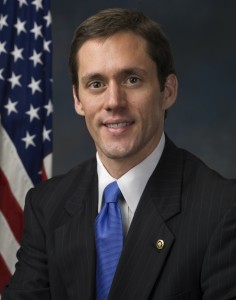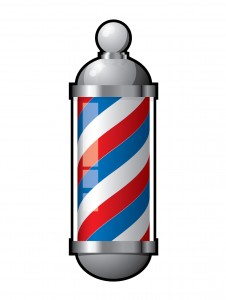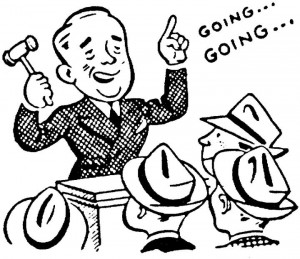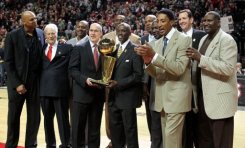 When Jonathan Miller called me and asked whether I would be interested in contributing a piece to a new website he was starting called “The Recovering Politician,” I was admittedly a little reluctant. First, I’m wary of the characterization of “politician” – not because of any negative connotation, but rather because I’m not sure I qualify since I never had sought elective office And irrespective of that first concern, I’m fully aware that it would be quite a stretch to claim that I’ve “recovered” from the extraordinary experience of serving in the United States Senate.
When Jonathan Miller called me and asked whether I would be interested in contributing a piece to a new website he was starting called “The Recovering Politician,” I was admittedly a little reluctant. First, I’m wary of the characterization of “politician” – not because of any negative connotation, but rather because I’m not sure I qualify since I never had sought elective office And irrespective of that first concern, I’m fully aware that it would be quite a stretch to claim that I’ve “recovered” from the extraordinary experience of serving in the United States Senate.
Last July, 2010, Governor Joe Manchin of West Virginia appointed me to fill the vacancy caused by the passing of Senator Robert C. Byrd – one of the true lions of the Senate and West Virginia’s most beloved public servant. Senator Byrd cast quite a long shadow, and it was daunting to contemplate being appointed to fill the seat previously occupied by the longest serving legislative member in the history of the United States. I could not begin to replace Senator Byrd or ever hope to fill his enormous shoes, but what I could do was emulate his work ethic and commitment to West Virginia – which is precisely what I strove to do during my four months in Washington, a town ruled by Congress, blackberries and Members-only elevators, and a place where fame (and infamy) can come and go in a matter of hours.
(Side note: Years ago, former Oklahoma standout and Chicago Bull forward Stacey King saw limited action in an NBA game, hitting a single free throw. That same night, his teammate Michael Jordan poured in sixty-nine points. Afterwards, King joked that he would always remember that game as the night that he and Jordan “combined for 70 points.” Similarly, rather that describing my term as “four months,” I usually characterize it by saying that Senator Byrd and I combined to serve over 52 years in the United States Senate. )
Within days of my arrival, men and women I had studied in law school were introducing themselves to me, welcoming me as one of their own, then asking for my vote in the same sentence. And I wasn’t alone; I was immediately put at the helm of a full Senate staff – many of whom had served for decades under Senator Byrd. I was given a personal secretary and press secretary – no longer would I be the one answering the phone in my own office. However, I declined the offer of a personal driver and did the unthinkable – walked myself to work.
In no particular order, here are some random recollections and highlights from that heady time:
Press coverage & John Daly’s Pants?
I had to adjust quickly to the media attention. I’d considered myself prepared for the press, after having spent four years as a senior staffer in the Governor’s office, doing the occasional TV or radio interview. Yet, the appointment shot the level of attention into the stratosphere, with newspapers, television, blogs and everything in between weighing in with their thoughts on the relative merits of my appointment. Nothing was off-limits. To the delight of my buddies, one website offered an online poll debating where my looks stacked up against my fellow Senators, while a local West Virginia paper registered their enthusiasm for the appointment by describing it succinctly as “a letdown.”
Indeed, the temporary burst of attention became so intense that on the day that my appointment was announced, I briefly topped Google’s Hot Searches, besting former NBA star Penny Hardaway, the iphone 4, and golfer “John Daly’s pants.” I haven’t had the inclination to go back and find out why Daly’s pants made the top 10 that day.
CNN and the case for professional barbers
 After calling my brother in Illinois and asking him to drive home for the announcement two days later, he had to get time off from his new banking job, which he had just started earlier that week. The bank CEO was a little skeptical at my brother’s justification for the leave request, at least until he turned on CNN that Friday.
After calling my brother in Illinois and asking him to drive home for the announcement two days later, he had to get time off from his new banking job, which he had just started earlier that week. The bank CEO was a little skeptical at my brother’s justification for the leave request, at least until he turned on CNN that Friday.
Speaking of CNN, once your photograph and video is splashed across network and cable news, that suggestion that your wife had been making for years that you should quit cutting your own hair finally begins to sink in. In hindsight, a pair of those Daly pants might have distracted viewers from the hatchet job that my old clippers had done the previous week.
Mt. Alto Auction House Rules
By the time I arrived in D.C., the Senate was embroiled in a contentious debate regarding the extension of federal unemployment assistance for millions of Americans. Following weeks of deliberation and the inability to break a Republican filibuster, the measure was scheduled to come to the floor for a vote immediately following my swearing in ceremony on July 21. Fifty-seven members of my party’s caucus were supporting the bill, along with two members of the minority party; given this mathematical breakdown, it was characterized by the media that I would be casting the “deciding” vote.
With nearly 20,000 West Virginians in dire need of this temporary assistance, along with over two million Americans, I was inclined to support the extension, an inclination that was bolstered by my subsequent research and review of the legislative materials. As such, I was expected to be the final vote necessary to end debate on the bill and pass the measure. Accordingly, the realization dawned on me that I was playing a role of outsized importance on this, my first vote as a member of the Senate.
And as I strode onto the floor of the Senate to take my oath, it was easy to become overwhelmed by the moment – the sight of my wife Rochelle and my entire family beaming in the gallery, emotional thoughts on the sudden passing of my father just three months earlier, and the gravity of the situation itself and my role in it all coming together in a very serious way. Yet, as the roll call began, all of my confidence and preparation soon gave way to a more pressing concern: how to vote?
 About a half-mile from where I grew up in Mt. Alto, West Virginia, there was an auction house that was packed to the rafters every Friday and Saturday night. As anyone who has attended an auction there will tell you, the most important rule you need to know is HOW to bid – and of course, how not to bid. In many auctions, a raised arm may work for newcomers, while a familiar nod would suffice for the regulars. Similarly, depending upon the auction, the scratch of an ear, raising a thumb, or taking off a jacket could successfully submit a bid (or unsuccessfully if done unknowingly). The best way to learn these subtle differences is to watch.
About a half-mile from where I grew up in Mt. Alto, West Virginia, there was an auction house that was packed to the rafters every Friday and Saturday night. As anyone who has attended an auction there will tell you, the most important rule you need to know is HOW to bid – and of course, how not to bid. In many auctions, a raised arm may work for newcomers, while a familiar nod would suffice for the regulars. Similarly, depending upon the auction, the scratch of an ear, raising a thumb, or taking off a jacket could successfully submit a bid (or unsuccessfully if done unknowingly). The best way to learn these subtle differences is to watch.
Indeed, that is precisely what I had planned to do (to the extent that the mechanical process of voting had even dawned on me at that point). And yet as the clerk continued calling the roll, it quickly became apparent that there was no discernable system for casting your vote. Moreover, there did not seem to be any particular order to the names being called out by the clerk. Instead, my fellow Senators would crowd in front of the clerk’s desk and offer various hand signals, nods, and head-shakes that apparently only the clerk could decipher. Others simply strolled by quickly offering the same. There was at least one thumbs-up accompanied by the word “No,” and I could have sworn I saw someone give the old Bobby Cox steal signal.
I suppose I had anticipated a mechanical system like the one that I had grown accustomed to working with the West Virginia Legislature during my time in the Governor’s office. The benefits of such a system were evident – you hit a button (which was color coded to guide you), got immediate feedback on an illuminated board displaying your vote, along with helpfully displaying the votes of your colleagues. No such luck. So here I was, having received coverage on everything from NBC Nightly News to Vanity Fair, filling the seat of a certifiable legend in the world’s greatest deliberative body, and having the important responsibility of breaking a filibuster (all of which lead Google users to deem me more interesting than John Daly’s pants), and yet no one had thought to tell me how to vote. Fearful of having any signal misinterpreted, I walked to the clerk and carefully offered my “aye” vote, which, when reported aloud by the clerk, prompted the clan of rowdy West Virginians amassed in the gallery to break into cheers (prompting, in turn, calls for order from the chair and stern looks from the Sergeant at Arms).
Today, a framed copy of that very roll call hangs outside my office, a reminder not only of my small role in helping to pass this important legislation, but also of the first rule in any auction house – knowing how to bid.
– – – – –
I garnered many more memories during the remainder of my time in the Senate, some personal (like the birth of my beautiful daughter), others professional (such as the privilege, as a practicing lawyer, of standing on the floor of the Senate chamber and casting an “aye” for the confirmation of a Supreme Court Justice). It was and it will always remain my enduring privilege to have represented West Virginia in that esteemed body.
So have I “recovered”? Well, I know that there will always be a strong pull to feel, as I did when I cast that deciding vote on extending unemployment benefits, that I would be making a difference in the lives of West Virginians, the people I know, that I grew up with, that are my neighbors, many of whom have seen hard times while our economy struggled. So after November, when my term was over and I was back in West Virginia, some of these folks would approach me, look me in the eye and say “thanks,” telling me how I had made a difference in their lives, and I realized that was something that I will always strive to do, even without the title of “Senator” in front of my name.
I am not sure that sounds like a “recovery,” but I know that it was an experience that I will always treasure.











Leave a Reply